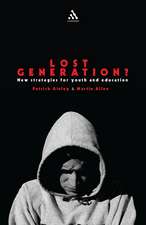Education, Individualization and Neoliberalism: Youth in Southern Europe: Bloomsbury Critical Education
Autor Valerie Visanichen Limba Engleză Paperback – 28 dec 2022
| Toate formatele și edițiile | Preț | Express |
|---|---|---|
| Paperback (1) | 190.06 lei 43-57 zile | |
| Bloomsbury Publishing – 28 dec 2022 | 190.06 lei 43-57 zile | |
| Hardback (1) | 655.42 lei 43-57 zile | |
| Bloomsbury Publishing – 24 iun 2020 | 655.42 lei 43-57 zile |
Preț: 190.06 lei
Preț vechi: 248.67 lei
-24% Nou
Puncte Express: 285
Preț estimativ în valută:
36.37€ • 38.07$ • 30.27£
36.37€ • 38.07$ • 30.27£
Carte tipărită la comandă
Livrare economică 31 martie-14 aprilie
Preluare comenzi: 021 569.72.76
Specificații
ISBN-13: 9781350192485
ISBN-10: 1350192481
Pagini: 192
Dimensiuni: 156 x 234 x 25 mm
Greutate: 0.27 kg
Editura: Bloomsbury Publishing
Colecția Bloomsbury Academic
Seria Bloomsbury Critical Education
Locul publicării:London, United Kingdom
ISBN-10: 1350192481
Pagini: 192
Dimensiuni: 156 x 234 x 25 mm
Greutate: 0.27 kg
Editura: Bloomsbury Publishing
Colecția Bloomsbury Academic
Seria Bloomsbury Critical Education
Locul publicării:London, United Kingdom
Caracteristici
Offers a new critical analysis of the changes in opportunities and constraints in post-compulsory education for youth in contemporary neoliberal individualized Western societies
Notă biografică
Valerie Visanich is Lecturer in the Department of Sociology at the University of Malta, Malta.
Cuprins
Introduction1. The Extension and Expansion of Education2. The Currency of Academic Credentials, Consumerism and Financial Burdens3. Unemployment in the Graduate Economy4. Neoliberal Subjectivity: A Way of Doing Things5. Shock-Absorbers for Youth in the South 6. 'Slow Motion' Changes in the South: The Case of a Small Southern European State 7. The Meanings and Feelings of Tertiary Educated Millennials in the SouthSummary and ConclusionsBibliographyIndex
Recenzii
Once the preserve of a small elite, higher education in many countries today has become available to large numbers of young people. At the same time, it has become heavily commodified - opened up to market forces, rather than supported by public funding. Students are incurring huge levels of debt, against the backdrop of pronounced uncertainty in future labour markets, given the pace of change being created by technological innovation and AI. Millennials, Visanich makes clear, are caught up in a vast social and economic experiment whose outcome is largely unknown but fraught with risk and uncertainty. The book is of especial interest since it analyses these issues against the background of Southern Europe, where the individualism promoted by a market-driven ethos runs up against more traditional forms of social and cultural life.'
"Avid travellers, digital natives, savvy consumers and foodies, but also bags of nerves, riddled by unmet expectations: we think we know what millennials are and what they face. But the winds of neoliberalism and globalisation do not blow everywhere in the same way. In this timely book, Valerie Visanich unpacks how the southern European periphery - small and archipelagic Malta, in particular - nuances millennial lives via such devices as protective welfarism and resilient kinship networks."
This is a very conscientious treatment of the transition to adulthood of highly educated 'millenials' under the hegemony of neoliberalism generally today and in the comparatively marginal circumstances of Southern Europe. Visanich's study concentrates specifically on the island of Malta. It is rich in examples and ethnographic details that are of much wider significance than the peculiarly Maltese experience.
"Avid travellers, digital natives, savvy consumers and foodies, but also bags of nerves, riddled by unmet expectations: we think we know what millennials are and what they face. But the winds of neoliberalism and globalisation do not blow everywhere in the same way. In this timely book, Valerie Visanich unpacks how the southern European periphery - small and archipelagic Malta, in particular - nuances millennial lives via such devices as protective welfarism and resilient kinship networks."
This is a very conscientious treatment of the transition to adulthood of highly educated 'millenials' under the hegemony of neoliberalism generally today and in the comparatively marginal circumstances of Southern Europe. Visanich's study concentrates specifically on the island of Malta. It is rich in examples and ethnographic details that are of much wider significance than the peculiarly Maltese experience.




































